Mauritania / الجمهورية الإسلامية الموريتانية – Let’s explore here
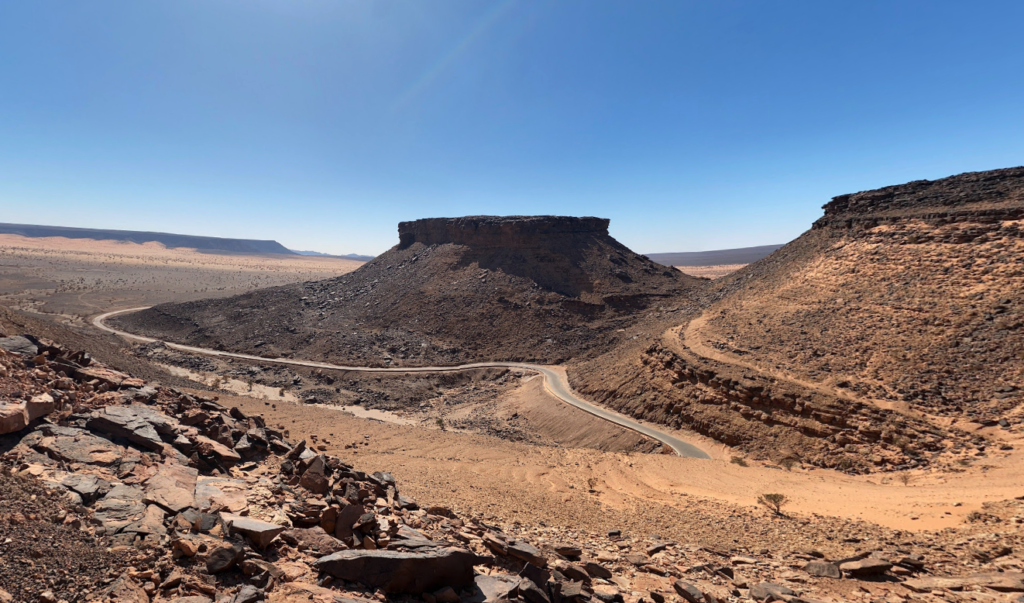
What’s it like in Mauritania?
Mauritania is a poor, mainly flat, desert country in north western Africa that meets the coast of the Atlantic Ocean. Parts of Macronesia lie just off the coast. The terrain throughout the country is almost entirely Saharan desert, and includes the fascinating Richat Structure, also known as the ‘Eye of Sahara’ – an incredible circular geological feature that can be seen from space. The highest point is Kediet ej Jill, in the north west of the country, at 3,002 ft (915 m) above sea level.
The population of Mauritania is around 4½ million people (2024), about 1½ million of whom live in the metropolitan area of the capital, Nouakchott. It shares land borders with Mali, Senegal, Morocco, the disputed Western Sahara, and Algeria.
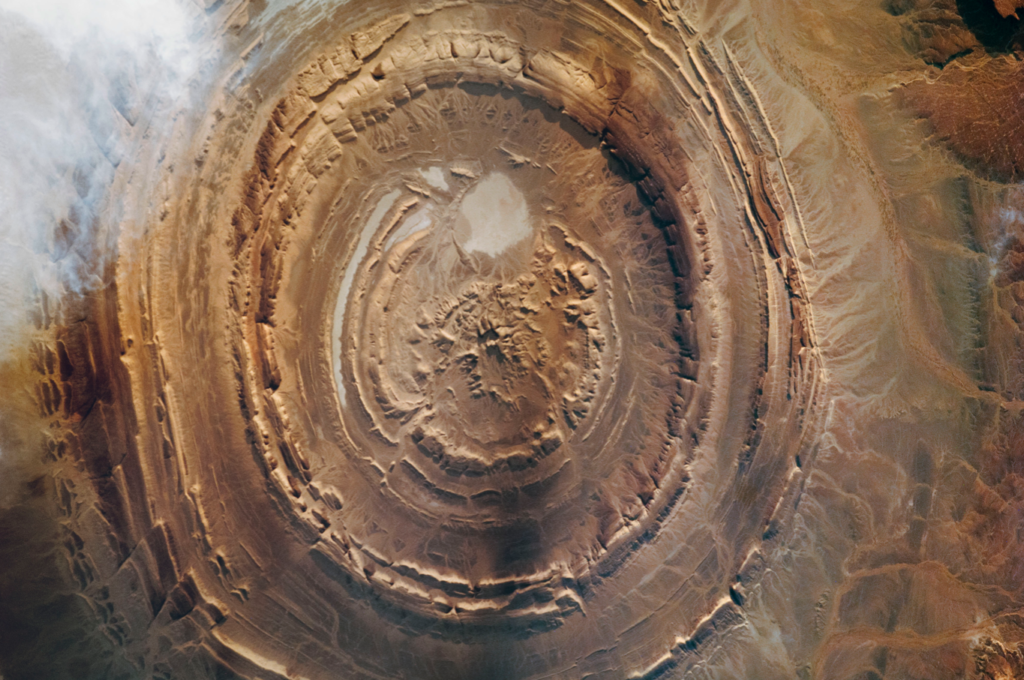
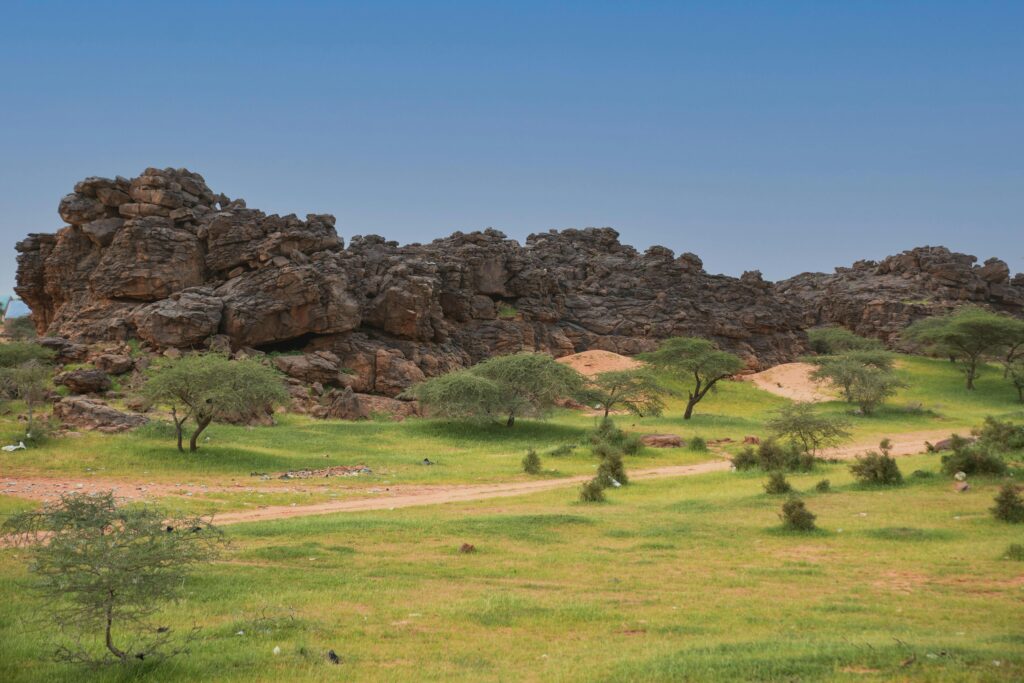
A bit about the history of Mauritania
Early History and Indigenous Societies
Mauritania has a long history shaped by a variety of indigenous groups, including the Berbers and the Moors. The region has been influenced by several ancient civilisations, including the Carthaginians, Romans, and the Islamic Caliphates. Mauritania’s strategic location made it an important crossroads for trade, including the trans-Saharan trade routes, where goods such as salt, gold and slaves were exchanged.
Islamic Influence and the Spread of Islam
Islam spread to Mauritania in the 8th century through the influence of Arab traders and conquerors. Over time, Islam became deeply entrenched in the culture and identity of the Mauritanian people. The country has a long history of Islamic scholarship, with the city of Chinguetti being recognised as one of the oldest centres of Islamic learning in the world. By the 11th century, Mauritania had become an important part of the larger Islamic world, particularly under the rule of various Berber dynasties.
French Colonial Rule
In the late 19th century, Mauritania became a French colony, part of French West Africa. The French established control over the region in the 1900s, although resistance from local tribes and leaders continued for years. During the colonial period, Mauritania’s economy was primarily based on agriculture, fishing and the exploitation of its natural resources. French rule, like in many parts of Africa, was marked by economic exploitation and the suppression of local traditions and political autonomy.
Path to Independence
After World War II, colonial empires across Africa began to weaken, and calls for independence grew stronger. Mauritania gained its independence from France on 28 November 1960, following a peaceful process. The first president, Moktar Ould Daddah, was a key figure in the country’s transition to independence. He oversaw the creation of a single party state and sought to modernise Mauritania’s economy while maintaining strong ties with France.
The Daddah Presidency and Early Challenges
Moktar Ould Daddah’s government sought to build a modern nation state, but his time in power was marked by political and economic difficulties. His policies were initially focused on nation building, but the country faced significant challenges, including poverty, social inequality and the pressures of regional conflicts. Mauritania also faced tensions over its vast desert territory, particularly with neighbouring countries. In 1978, after a series of military defeats in the Western Sahara War and internal unrest, Daddah was overthrown in a coup led by military officers.
Military Rule and Instability
Following the coup, Mauritania entered a period of military rule. Several military regimes came to power, and the country faced political instability and economic difficulties. In 1981, Mauritania became one of the last countries in the world to officially abolish slavery, but it continued to be a significant issue in the country, with reports of slave-like practices persisting for decades. During the 1980s and 1990s, Mauritania was involved in the Western Sahara conflict, supporting the Polisario Front in its fight against Morocco for the independence of the Western Sahara. The conflict created significant tensions with neighbouring Morocco and contributed to the country’s internal instability.
Transition to Civilian Rule
In 1991, following years of military rule, Mauritania began transitioning toward a more democratic system with the drafting of a new constitution. In 1992, the first multi party elections were held, and military leader Maaouya Ould Sid’Ahmed Taya won the presidency. Taya’s government initially gained support for its attempts at economic reform and modernisation, but his rule became increasingly autocratic, marked by human rights abuses, repression of opposition and a focus on maintaining power. Taya’s government was also criticised for its policies toward the country’s black African population, which faced discrimination and marginalisation. In 2003, Mauritania experienced a major human rights scandal with the discovery of a major slave trade network operating within the country.
The 2005 Coup and Its Aftermath
In August 2005, President Taya was overthrown in a coup led by military officers. The coup was largely peaceful, and the military vowed to return the country to civilian rule. Following the coup, the National Council for the Salvation of Democracy and Development was formed, and a transition to democracy began. The new military-led government organised elections, and in 2007, the country held its first democratic presidential election in decades.
The 2007 Election and Rise of Mohamed Ould Abdel Aziz
In 2007, Sidi Ould Cheikh Abdallahi won the presidency in Mauritania’s first multi party election since the coup. However, Abdallahi’s presidency was short lived, and in 2008, he was overthrown in a military coup led by General Mohamed Ould Abdel Aziz, the leader of the 2005 coup. Aziz’s government promised to stabilise the country and strengthen its democratic institutions, but his rule became increasingly autocratic. In 2009, Aziz ran for president and won the election, though it was marred by accusations of electoral fraud. Aziz’s presidency focused on improving Mauritania’s economy, particularly through the exploitation of its mineral resources. However, his government faced ongoing criticism for human rights abuses, lack of political freedoms and the continued marginalisation of certain groups, particularly the black African minority.
The 2019 Election and Political Changes
In 2019, Mohamed Ould Abdel Aziz was constitutionally barred from running for a third term, and a new election was held. In the election, Aziz’s chosen successor, Mohamed Ould Ghazouani, won the presidency. Ghazouani, a former general and close ally of Aziz, promised to continue the policies of his predecessor while attempting to introduce more reforms. His government has focused on combatting terrorism, improving infrastructure and addressing issues such as unemployment and poverty. However, despite these promises, Ghazouani’s administration has faced challenges related to corruption, human rights and the ongoing issue of slavery-like practices. The country’s political landscape remains fragile, with periodic protests and unrest, particularly from groups demanding more rights and representation.
Security and Extremism in the Sahel Region
Mauritania, like many countries in the Sahel, has faced increasing threats from extremist groups, including Al-Qaeda in the Islamic Maghreb and Islamic State affiliates. The country’s strategic location near the Sahel has made it a target for militant groups seeking to expand their influence in the region. Mauritania has been involved in regional counterterrorism efforts, working closely with international partners such as France and the United States. However, the security situation remains volatile, and Mauritania continues to face periodic attacks from extremist groups.
Looking Ahead
As of 2025, Mauritania remains in a period of political and economic transition. While the country has made progress in democratic governance, significant challenges remain, including poverty, inequality, political instability and the persistent issue of slavery. Security concerns related to terrorism and regional instability in the Sahel continue to pose a threat to the country’s future. The government’s ability to address these issues, strengthen democratic institutions, and promote economic growth will be crucial in shaping Mauritania’s future trajectory.
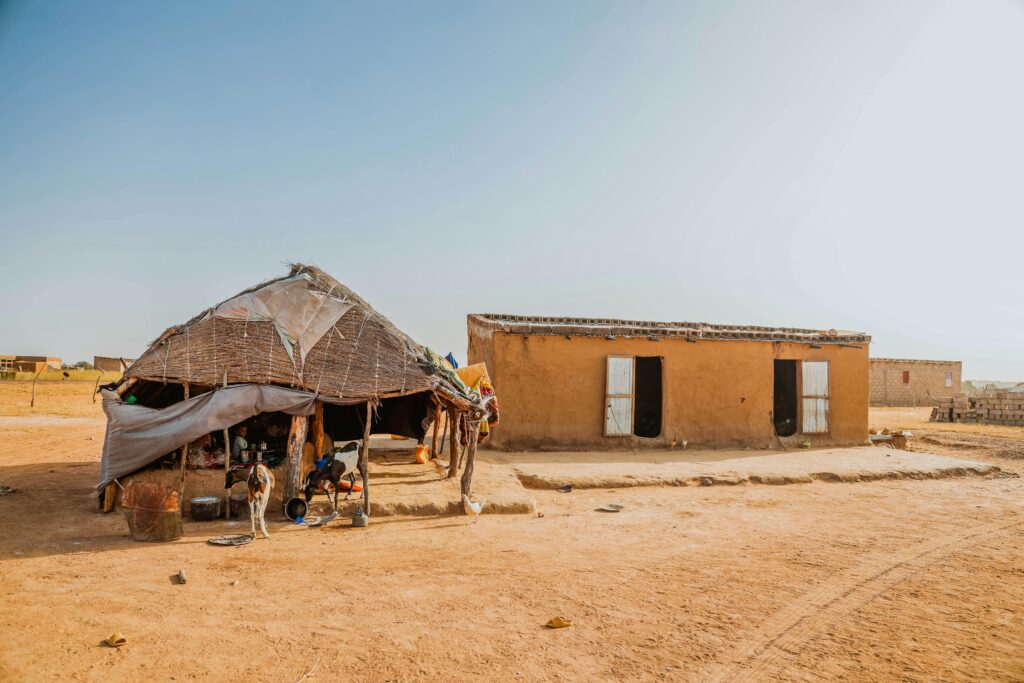
Mauritania road trip
Our Mauritanian road trip is part of a much larger African road trip.
Map of our road trip through Mauritania
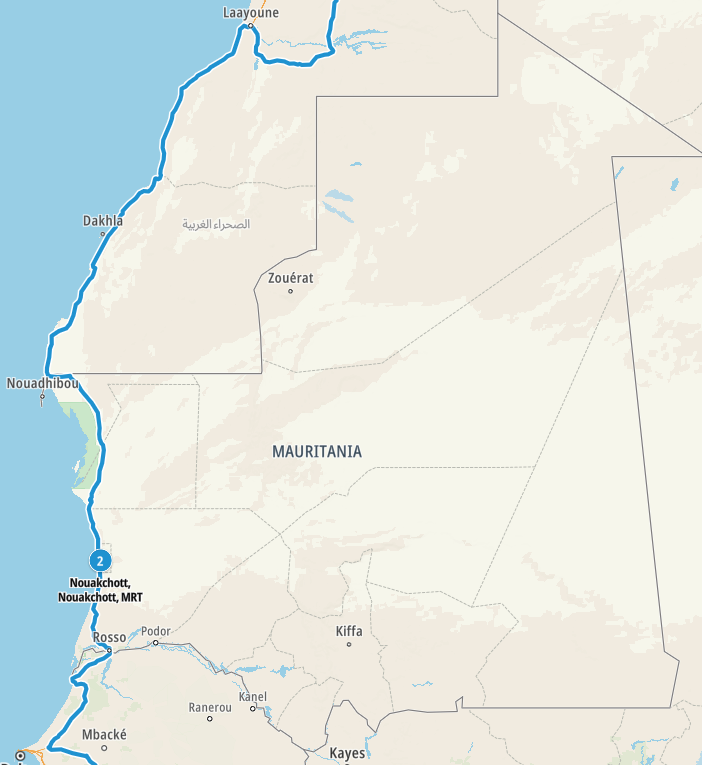
Our current planned route takes us from Morocco and Western Sahara along the coast of Mauritania towards the capital, Nouakchott, before heading on to Senegal.
No doubt our route will change as we explore some more of the country inland.
Hopefully our journey will improve our knowledge of this intriguing and beautiful country, and enable us to meet some interesting people. We’ll be updating this page at that time – don’t forget to check back 🙂
What’s it like to drive in Mauritania?
They drive on the right hand side of the road in Mauritania. In the main, roads are very poor, with many being unsurfaced dirt tracks. Driving standards are also poor.
Do you require an international driving permit in Mauritania?
We’ve created a dedicated page to driving abroad, which answers this question, and more, which you might find helpful.
Can you use your UK driving license when driving through Mauritania?
We’ve created a dedicated page to driving abroad, which answers this question, and more, which you might find helpful.
Do I need a carnet de passages to drive in Mauritania?
We’ve created a dedicated page to driving abroad, which answers this question, and more, which you might find helpful.
What currency do they use in Mauritania?
In Mauritania they use the Mauritanian ouguiya, although US dollars are also accepted in many places. Cash is widely used. The use of credit / debit cards is not widely accepted. Travellers cheques are generally accepted. There are few ATMs in cities and towns throughout the country.
You should make yourself aware of the amount that your bank charges you for using credit and debit cards abroad. Often credit cards are cheaper for purchasing items directly, and for withdrawing cash from ATMs.
What language do they speak in Mauritania?
They speak Arabic in Mauritania, and to the East towards Senegal they speak Wolof. French is also widely spoken, whereas English is not widely spoken.
What time zone is Mauritania in?
Remember, when you’re planning your next trip to take a look at what time zone it’s in.
Do I need a visa to visit Mauritania?
We’ve created a dedicated, more comprehensive page on visas, which you should find helpful. Check it out!
Is wild camping legal in Mauritania?
Yes, wild camping is fine in Mauritania.
What plug / socket type do they use in Mauritania?

In Mauritania they use plug / socket type C.
Health issues in Mauritania
Is it safe to drink water in Mauritania?
No, it is not safe to drink tap water in Mauritania. Bottled water is readily available throughout the country.
What vaccinations are required for Mauritania?
This NHS website is kept up to date with all relevant information on vaccinations in Mauritania.
Phones in Mauritania
What is the country calling code for Mauritania?
The country calling code for Mauritania is +222
What are the emergency phone numbers in Mauritania?
- The emergency number for police in Mauritania is: 117
- In Mauritania, the emergency number for ambulance is: 101
- The emergency number for fire in Mauritania is: 118
If you’ve got some useful info that you’d like to share, let us know!
And don’t forget to check out all the other pictures!
